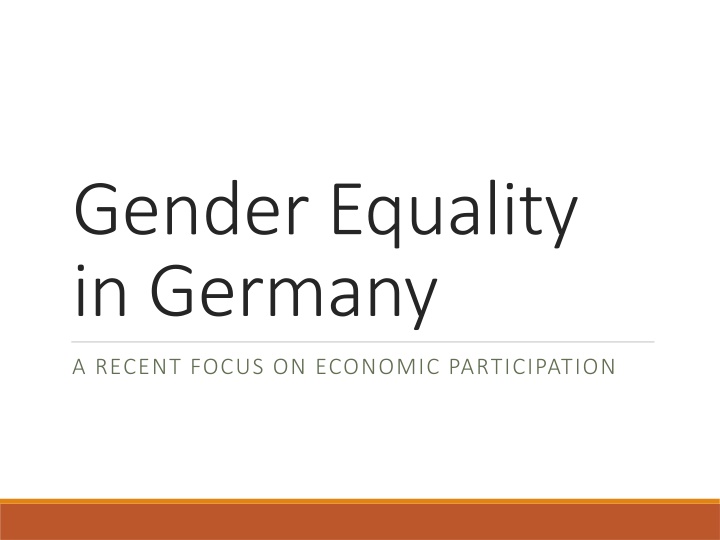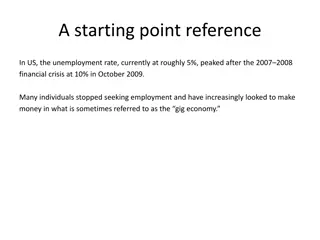
Gender Equality in Germany: Recent Focus on Economic Participation
"Explore the current status of gender equality in Germany with a focus on economic participation, highlighting key areas such as higher education, political participation, and measures taken towards achieving equality. Discover facts and initiatives aimed at addressing the gender pay gap and promoting women's rights. Stay informed about the progress and challenges in creating a more equitable society in Germany."
Download Presentation

Please find below an Image/Link to download the presentation.
The content on the website is provided AS IS for your information and personal use only. It may not be sold, licensed, or shared on other websites without obtaining consent from the author. If you encounter any issues during the download, it is possible that the publisher has removed the file from their server.
You are allowed to download the files provided on this website for personal or commercial use, subject to the condition that they are used lawfully. All files are the property of their respective owners.
The content on the website is provided AS IS for your information and personal use only. It may not be sold, licensed, or shared on other websites without obtaining consent from the author.
E N D
Presentation Transcript
Gender Equality in Germany A RECENT FOCUS ON ECONOMIC PARTICIPATION
Some Facts Germany is the 4thlargest economy in the world, has a highly educated population and high social awareness towards gender equality. In Germany, women's rights are protected under the 2006 Law on Equality of Treatment, which generally prohibits discrimination on the basis of gender as well as ethnicity, age, sexual orientation, physical handicaps or religion. The European Institute for Gender Equality (EIGE) placed Germany 12th in a ranking of all EU 28 member states in its new Gender Equality Index.
Gender Equality in Three Areas Higher Education Roughly same number of women and men in higher education. Political Participation Women make 31% of the deputies in Bundestag, which is a 19-year low. (The figure was 37.1% in the previous parliament). Economic Participation Women on boards of largest 30 companies make only 12.1%. The average wage for women in Germany in 2016 was 21 % (non-adjusted figure) below the average wage for men, according to the Federal Statistical Office (DeStatis).
18 18th thof March of March Equal Pay Day in Germany in Germany Equal Pay Day What do the organizers of Equal Pay Day in Germany believe are the main causes of the gap? They identify five issues: 1) the lack of women in certain sectors and upper career levels; 2) women interrupting their working lives longer than men for family reasons; 3) the sort of careers women typically work in being under-appreciated; 4) gender wage inequities often being not visible as such; 5) gender stereotypes influencing women's choice of careers.
Measures towards Gender Equality 2015 Gender Quota Law for Large Companies: This requires large companies to allocate 30 percent of non-executive board seats to women. 2016 - Wage Transparency Law of 2016: This law allows women to ask employers to provide information about average rates of pay for men and women in specific tasks. There are limits to these legal protections. The Transparency Law, for instance, applies only to large companies with more than 200 employees. And at the upper rungs of the corporate ladder, it is very difficult to identify enough male and female peers for comparison.






















